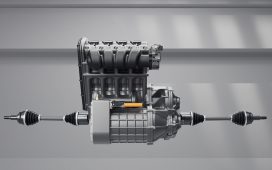Plummeting temperatures have a negative effect on an EV’s batteries because when the lithium ions move from anode to cathode, the cold slows the rate at which this can happen, which in turn restricts battery performance.
Range testing from our sibling title What Car? revealed that an XC40’s range plummeted by as much as 29.9% in cold weather testing compared with its warm-weather range. The Norwegian Automobile Federation found similar results.
Manufacturers have remained tight-lipped about these sorts of results – including Volvo. When pressed, a spokesperson said he was “unable to comment on the cold-weather performance of different Volvos”.
Why winter testing is so important
I park an EX30 outside of Lulea airport, get out and go to the boot to retrieve my luggage. The tailgate opens itself electronically after the press of a small button. Because of the cold, that button is covered by a thin layer of ice.
I poke through the frost with my thumb and press it lightly. It opens as normal. Then the penny drops: the importance of winter testing isn’t limited to dynamics.
Some goals of winter testing are measurable, but broadly they’re empirical: the cars need to work in extreme conditions.
Winter testing doesn’t sit nicely in one department’s yearly budget. It’s a holistic answer to countless questions, many of which are yet to be asked.
Where do winter testers go?
Arjeplog, Sweden
The big one: nearly all car manufacturers visit this Swedish municipality, situated 150 miles west of Lulea, for winter testing due to its consistently harsh and snow-filled weather. Some manufacturers, such as BMW, have permanent facilities there.
Wanaka, New Zealand
The Southern Hemisphere Proving Grounds in Wanaka offers winter testing from June to September and, unlike with Sweden, there are no frozen lakes: it’s all land-based. Tesla has tested its Models S, Model X, Model 3 and Model Y and Cybertruck here.












